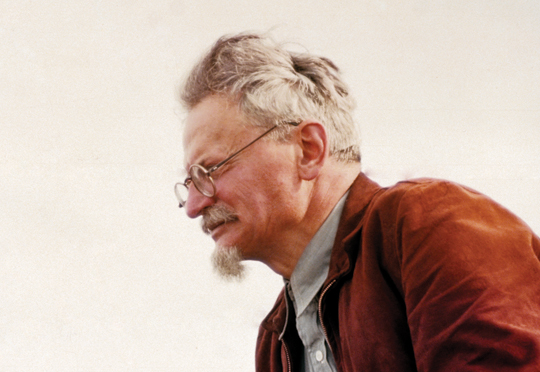“I can see the bright green strip of grass beneath the wall, and the clear blue sky above the wall, and sunlight everywhere. Life is beautiful. Let the future generations cleanse it of all evil, oppression, and violence, and enjoy it to the full.”
Leon Trotsky wrote those words the day before he was attacked by his assassin in Coyoacán, Mexico, where he was living in exile. He knew he would die soon, either due to his declining health or by murder at the hands of Stalinism. Trotsky had been chased around the world, the sworn enemy of capitalists and the Communist Party. All four of his children had been murdered at the behest of Stalin, as had many of his close advisors. By the time he was writing those words, Trotsky had seen the hope of socialism in Russia become perverted by a monstrous counterrevolutionary bureaucracy led by Stalin.
And yet, despite all of that, Trotsky held the deepest conviction that life is beautiful and that socialism can win. He was convinced of revolution and of the role future generations have in bringing about a world free of exploitation and oppression.
We see Trotsky’s ideas as the thread of revolutionary continuity, from Marx and Engels to his contemporaries, the great Rosa Luxemburg and Vladimir Lenin. We believe those ideas still point the way forward for revolutionaries today, 80 years after his assasination by a Stalinist agent. That is why we call ourselves Trotskyists.
You may be interested in Leon Trotsky’s Legacy and the Present
Trotsky’s legacy is enormous in both its depth and breadth. For the purposes of this article — and as an introduction to the revolutionary whose tradition we continue — we’ve distilled Trotsky’s ideas into eight principles. While this list is by no means exhaustive, we hope it serves as an introductory guide to the revolutionary political tradition of Trotskyism.
Revolution
Marx studied the development of history and determined, “The history of all hitherto existing society is the history of class struggle.” He saw clearly that, in class society, the ruling class does not simply surrender its dominance through persuasion or elections. This basic Maxist principle is in The Communist Manifesto: “The proletariat cannot conquer power within the legal framework established by the bourgeoisie. Communists openly declare that their ends can be attained only by the forcible overthrow of all existing social conditions.” The ruling class and the capitalist system must be crushed. Only on its grave can a new, socialist society be built.
Trotsky argued against the social democrats, led by the ideas of Eduard Bernstein and Karl Kautsky in Germany, who abandoned class struggle in favor of pursuing a failed strategy of attrition. They sought to wear away at capitalism gradually in order to “weaken” it. But Trotsky knew that we cannot vote socialism into office, as social democrats have attempted (and failed) to do. Trotsky wrote,
The democracy fashioned by the bourgeoisie is not, as both Bernstein and Kautsky thought, an empty sack which one can undisturbedly fill with any kind of class content. Bourgeois democracy can serve only the bourgeoisie … Whenever this ‘committee’ manages affairs poorly, the bourgeoisie dismisses it with a boot.
Trotsky is correct; every time socialists have attempted to simply “fill” bourgeois democracy with socialist content, the capitalists have “dismissed it with a boot,” establishing brutal dictatorships like in Pinochet’s Chile or Franco’s fascist regime in Spain. Trotsky instead called on socialists to prepare for and undertake a revolution to overthrow — not collaborate with — the capitalist class.
Trotsky also fought against those who believed a semi-feudal country like Russia couldn’t have a workers revolution. Many of Trotsky’s contemporaries argued that Russia would first have to undergo a capitalist transformation; they, therefore, allied with the bourgeoisie. Trotsky’s theory of permanent revolution, initially conceived to explain how Russia — the weakest link in the world capitalist chain — could be the country to have the first proletarian revolution, was developed and expanded to become the most potent conceptualization of how socialist revolution can occur where capitalism had not yet been achieved. It remains today a powerful rebuke of the idea of “stages” of revolution that has led to the abandonment of revolutionary struggles and so much deadly collaboration with the capitalist class.
Class Independence
It is impossible to prepare for revolution while collaborating with the capitalists. Trotsky knew it was essential for the working class to remain independent from the capitalist class — not to support them or join their organizations or coalitions, lest it lead to the defeat of the working class and socialists.
This is a different perspective than that of many other leftists traditions. Mao Zedong put forward the unity of four classes: peasantry, proletariat, petite bourgeoisie, and national bourgeoisie. Stalinists end up governing with the capitalists as part of popular fronts, and supporting capitalist candidates the world over. Social democrats today argue that socialists should support progressive Democrats such as Sanders or Ocasio-Cortez. There are even self-professed socialists who believe we should vote for capitalists as the lesser evil.
In some instances, class collaboration like this has resulted in the brutal repression of socialists and the working class, as in the massacre of communists in China by their former allies, the Kuomintang. Or they have resulted in bourgeois governments that manage austerity regimes on behalf of global capital while repressing workers and immigrants, as with Syriza in Greece or Podemos in the Spanish State.
Some ask: What about fighting fascists? Surely that’s a moment when we should unite with the capitalist class? Trotsky again brings clarity. He argued against unity with capitalists. Fascism preserves the interests of the capitalists, but a workers’ uprising threatens to overthrow them. He understood that in that fight, the capitalist class would always prefer fascism to the spectre of communism — a preference the capitalist class has demonstrated time and again. The repression of the working class and peasants by the popular-front government in Spain is a classic example. Fascism can’t be fought in alliance with capitalists; it can be defeated only by the unified action of the working class.
The Working Class is the Revolutionary Subject
Trotsky believed the working class will lead the revolution because it is the only sector in society able to strike at the heart of capitalist relations. That’s why Marx called the proletariat “the gravediggers of capitalism.” Capitalism is characterized by the exploitation of the working class to benefit the bosses; its labor is the source of all profits and all products. Therefore, workers are strategically positioned to end this system and put the means of production at the service of people, not profits.
This focus on the working class was lost by many later Marxists. Mao centered the peasantry as the revolutionary subject. But peasants are neither in a position to strike at capitalism nor to organize society for socialism. Trotsky believed peasants had a role to play, and that the workers’ revolution should support the peasantry’s demands for land redistribution from large landowners, for instance, as well as for their right to democratic decision making through peasant soviets. However, he saw that socialism would be established only with the working class at the helm of the revolution.
Other socialist groups also backed away from the working class as the revolutionary subject. In Cuba, Fidel Castro and Che Guevara dismissed the role of the mass mobilization of the working class as the revolutionary subject. They pursued, instead, a guerilla strategy with a small insurrectionary group aiming to take power. The Black Panthers built their organization outside of the organized working class, instead building neighborhood-based groups. Though militant and revolutionary, they lacked the strategic power of the working class and did not aspire to create a system of workers’ democracy.
Working Class Democracy
Trotsky not only saw the working class as pivotal in the overthrow of capitalism; he saw the self-organized working class as essential to organizing society democratically after the revolution. Workers have a powerful tool: they can withhold their labor — go on strike — in their fight against the capitalists. But they are also able to go back to work and organize the entirety of production in the service of all of humanity.
Marx looked to the brief but beautiful experience of the Paris Commune as an example of what a true workers’ democracy might look like. In the commune, all bureaucratic privileges were stripped away, with no administrator paid more than the average worker. Delegates were elected by the working class and oppressed to decision-making bodies, and were subject to immediate recall. The standing army and police of the capitalist state were dissolved immediately and replaced with workers’ militias. Marx, and later Trotsky, understood that it was only such a state — what Marx called the dictatorship of the proletariat — that could wither away and become communism. In this context, “dictatorship” means full control by the working class, so material production could be planned to serve the social and economic needs of the great majority.
Trotsky was able to see workers’ democracy in action in the form of the spontaneous creation of soviets — councils of workers’ and soldiers’ deputies — in the 1905 revolution and again in 1917. These democratic bodies served to organize the struggle and were the seeds for the councils that could govern all of society. In the midst of the brutal civil war, the soviets were disbanded temporarily — and when the Left Opposition fought to reconstitute them, the Stalinist bureaucracy refused and repressed those who tried. A central banner of Trotskyism is that workers’ democracy is imperative — something Stalin, Mao, Castro, and Ho Chi Minh all rejected.
A Revolutionary Combat Party
Marx and Engels wrote, “The organization of the proletariat as a class [is] consequently its organization into a political party.” In this sense, Marxists since have argued that a political party is needed to push for revolution in the heat of class struggle. Lenin is responsible for promoting the conception and realization of a vanguard party — that is, of workers who are most advanced in their revolutionary thinking — with mass influence. In the Russian Revolution, that was the Bolshevik Party. Lenin had the unique insight of forming a vanguard organization of workers, but also with students and intellectuals, who had strategic and programmatic agreements upon which they could unite and fight in a disciplined manner. It is a testament to Trotsky that while he initially believed that the Bolsheviks and the Mensheviks — who supported instead a broader organization — should unite, he came to see that Lenin was correct.
After joining the Bolsheviks, Trotsky supported the building of revolutionary parties for the rest of his life. He argued, “The revolutionary Party unites within itself the flower of the progressive [working] class. Without a Party which is able to orientate itself in its environment, appreciate the progress and rhythm of events and early win the confidence of the masses, the victory of the proletarian revolution is impossible. These are the reciprocal relations between the objective and the subjective factors of insurrection and revolution.”
Internationalism
Most who are even tangentially familiar with Marxism have heard the call, “Workers of the world, unite!” Internationalism emerges not just from a moral sense of class solidarity, but from the understanding that capitalism is global and constantly needs to grow, expand, and conquer and create new markets. There is no peaceful coexistence with capitalism.
You may be interested in Leon Trotsky Lives on in Our American Struggle
After the Russian Revolution in 1917, Trotsky held firm to the principle of internationalism, perpetually seeking paths by which the revolution that had begun in Tsarist Russia could be extended elsewhere in the world. The Stalinist bureaucracy turned its back on internationalism. Stalin invented the patently anti-Marxist theory of building “socialism in one country,” rather than working for world revolution, as a way to perpetuate the bureaucratic caste he was creating. This “theory” led the Stalinized Communist Parties to enter into alliances with capitalist governments, support capitalist wars, engage in “peaceful coexistence,” and betray uprisings of the oppressed. Stalinism became a counterrevolutionary force, acting against socialist revolutions around the world.
But the Stalinists were not the only ones on the left to abandon internationalism. The social democrats of Europe supported their own bourgeoisies when they came asking for financial credits to wage the imperialist World War I that pitted the working classes of different countries against one another. In response to that scandalous betrayal, Lenin bitterly pronounced, “The proletariat’s right to revolution was sold for a mess of pottage.”
Throughout his life, Trotsky never abandoned the fight for socialism, which he knew could only be realized in the international arena and through an uncompromising fight against imperialism. Socialists today — especially those in the United States and other imperialist countries — must be unequivocally internationalist, rejecting, exposing, and fighting against their imperialist, capitalist governments.
Further, Trotsky knew that internationalism had to be more than a sentiment. It was a call to action. That meant building an international party, not just a national one. That is why, despite the mass persecution unleashed by Stalin and despite all the lies told about Trotsky, he worked to found the Fourth International based on these and other principles.
Against Oppression
Trotsky believed that the politics of socialists had to have a special focus on the most oppressed sectors of society, such as people of color. He argued that The Communist Manifesto of Marx and Engels actually was deficient in its failure to address the specific oppression of people of color, and rectified this in an essay on the 90th anniversary of its publication. Trotsky wrote, “The movement of the colored races against their imperialist oppressors is one of the most important and powerful movements against the existing order and therefore calls for the complete, unconditional, and unlimited support on the part of the proletariat of the white race.”
Trotsky also believed that socialism would not be possible unless women were liberated from patriarchal oppression. After taking power, the Bolsheviks instituted the most progressive gender laws the world had ever seen, including legalizing abortion and divorce. But as Lenin argued, “Equality in law is not equality in life,” and so the Bolsheviks went even further, seeking to build the material conditions for the end of women’s oppression, including the socialization of domestic work and the withering away of the family as an organized unit of society. Under Stalin, though, the bureaucracy did away with the progressive laws of the Bolsheviks, and the more lofty goals were never again pursued. The Stalinist USSR was firmly rooted in the patriarchal family unit.
In founding the Fourth International, Trotsky noted that opportunist organizations, merely seeking numbers, quickly abandon the political support of oppressed people, because they fear the more reactionary sectors of the working class. This is antithetical to revolutionary principles and strategy. Trotsky wrote, “The decay of capitalism … deals its heaviest blows to the woman as a wage earner and as a housewife. The sections of the Fourth International should seek bases of support among the most exploited layers of the working class; consequently, among the women workers.” Trotsky knew that women workers — and the most oppressed more generally — will be among the vanguard of the revolution.
The Revolution Is Just the Beginning
For Trotsky, the working class taking power was only the beginning. Revolution would not immediately resolve all the problems of a class-based society or the prejudices of a society founded on oppression and the exploitation of the working class. Socialism, though, creates the economic conditions that make eradicating oppression possible. In a 1923 piece, Habit and Custom, Trotsky explained:
It is only the seizure of power by the working class which creates the premises for a complete transformation of morals … It is of course obvious that the complete change of morals — the emancipation of woman from household slavery, the social education of children, the emancipation of marriage from all economic compulsion, etc. — will only be able to follow on a long period of development, and will come about in proportion to the extent to which the economic forces of socialism win the upper hand over the forces of capitalism … In the workers’ state, culture works for socialism and socialism again offers the possibility of creating a new culture for humanity, one which knows nothing of class difference.
Trotsky not only dreamed of a world that knew nothing of class difference, exploitation, and oppression; he dedicated his life to fighting for it. He not only preserved the revolutionary legacy of Marxism, but elaborated upon and deepened it. We call ourselves Trotskyists because we take up the mantle of our revolutionary forebears and bring their lessons to bear upon the present. We carry on the principles and strategy of Trotsky so that we may bring all the struggles — past and current — to fruition.











